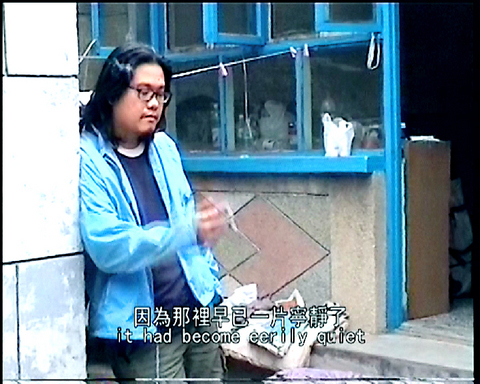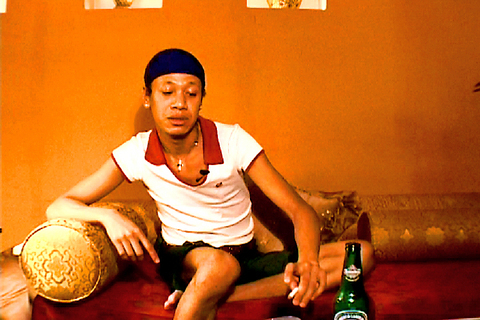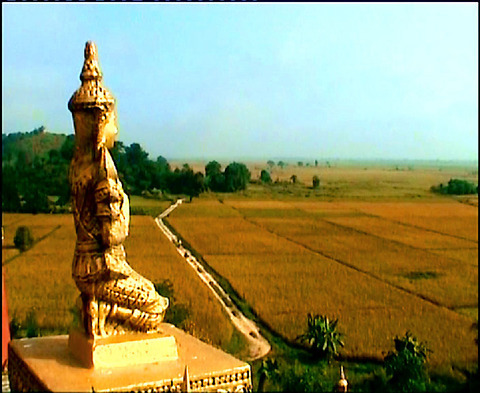If a weekend of imbibing alternative films and having a relaxed time quaffing beer with friends sounds intriguing, you need look no further than the Urban Nomad Film Fest (
Coming into its fifth year, the independent showcase presents a content-rich lineup of 40 works featuring surf and skateboard videos, short films, animations and documentaries made by underground talents from home and abroad.
Organized by the expat duo David Frazier and Sean Scanlan, Urban Nomad was set up with the aim of preserving underground creativity and demonstrating that the media is a democratic tool accessible to anyone who has something to say.

PHOTOS COURTESY OF URBAN NOMAD
"When people make films, they want the works to be seen. So we try to be more flexible about the deadline ... and screen as many of the submitted works as possible," co-founder Scanlan said.
As this year's focus is on alternative visions and documentaries, the festival offers an exciting mixture of works addressing political and social issues and subcultures from different regions, especially from the southeastern Asian countries including Singapore, Thailand, the Philippines and Malaysia.
One such film is Singapore Rebel. Banned in Singapore, the documentary is an emotionally-charged account of the political dissenter and opposition leader Chee Soon Juan, who, since 1992, has taken up the valiant mission to challenge the authoritarianism of the People's Action Party (PAP). He subsequently lost his job as a university professor, and was eventually forced into bankrupcy.

The film offers a rare chance for outsiders to see how the PAP uses oppressive methods to silence political opponents like Chee in the name of building a modern Asian society.
As co-founder and organizer Frazier said alternative film scenes in southeastern Asian countries have enjoyed strong growth in recent years. And as a young and growing alternative venue, Urban Nomad has reached out this year to fringe film festivals and curators in Thailand and the Philippines to bring out new underground voices.
"Ideally, we want Urban Nomad to become part of the underground network in Southeast Asia. Kids and young people in different places should understand each other through alternative media as opposed to big film festivals or dominant TV channels," Frazier said.

Representing the promising future of the local film community is Respire (
Highly stylish and poetically shot, the low-budget film is an inspiring example of how a work of art can be produced despite certain limitations. It was shot with old, sometimes even moldy, film rolls collected from commercial production houses in Taipei.
If you missed the opening film Surviving Beijing (

Idealistic and optimistic at first, the group settles down in the now bulldozed "Tree Village" in the suburb of Beijing, a legendary settlement of rock musicians and social drop-outs.
The film follows the failing attempts of the Malaysian rockers to get gigs and mingle with the tough crowds, and gives audiences an insight into the urban tribe of rockers who don't fit in to the fast-changing society and choose to live in poverty and make music as a social protest against China's rapid development toward capitalism.
For those who feel the three-hour-long programs of experimental film is just too much, there is a chill-out space for visitors to walk around, sip beer and enjoy a good chat with friends or strangers. At Urban Nomad, visitors will not find dark, confining theaters, but a film party where people are free to share their thoughts and feelings with other individuals.
Festival notes
What: Urban Nomad Film Fest (城市游牧影展)
Where: Huashan Cultural Center (華山文化園區), 1, Bade Rd Sec 1, Taipei (臺北市八德路一段1號)
When: Tonight beginning at 7:30pm; tomorrow and Sunday at 7pm.
Tickets: NT$200 for one day; NT$500 for a four-day festival pass.
For more information on films to be screened, visit www.urbannomadfilmfest.blogspot.com

Taiwan has next to no political engagement in Myanmar, either with the ruling military junta nor the dozens of armed groups who’ve in the last five years taken over around two-thirds of the nation’s territory in a sprawling, patchwork civil war. But early last month, the leader of one relatively minor Burmese revolutionary faction, General Nerdah Bomya, who is also an alleged war criminal, made a low key visit to Taipei, where he met with a member of President William Lai’s (賴清德) staff, a retired Taiwanese military official and several academics. “I feel like Taiwan is a good example of

March 2 to March 8 Gunfire rang out along the shore of the frontline island of Lieyu (烈嶼) on a foggy afternoon on March 7, 1987. By the time it was over, about 20 unarmed Vietnamese refugees — men, women, elderly and children — were dead. They were hastily buried, followed by decades of silence. Months later, opposition politicians and journalists tried to uncover what had happened, but conflicting accounts only deepened the confusion. One version suggested that government troops had mistakenly killed their own operatives attempting to return home from Vietnam. The military maintained that the

Before the last section of the round-the-island railway was electrified, one old blue train still chugged back and forth between Pingtung County’s Fangliao (枋寮) and Taitung (台東) stations once a day. It was so slow, was so hot (it had no air conditioning) and covered such a short distance, that the low fare still failed to attract many riders. This relic of the past was finally retired when the South Link Line was fully electrified on Dec. 23, 2020. A wave of nostalgia surrounded the termination of the Ordinary Train service, as these train carriages had been in use for decades

Lori Sepich smoked for years and sometimes skipped taking her blood pressure medicine. But she never thought she’d have a heart attack. The possibility “just wasn’t registering with me,” said the 64-year-old from Memphis, Tennessee, who suffered two of them 13 years apart. She’s far from alone. More than 60 million women in the US live with cardiovascular disease, which includes heart disease as well as stroke, heart failure and atrial fibrillation. And despite the myth that heart attacks mostly strike men, women are vulnerable too. Overall in the US, 1 in 5 women dies of cardiovascular disease each year, 37,000 of them